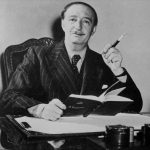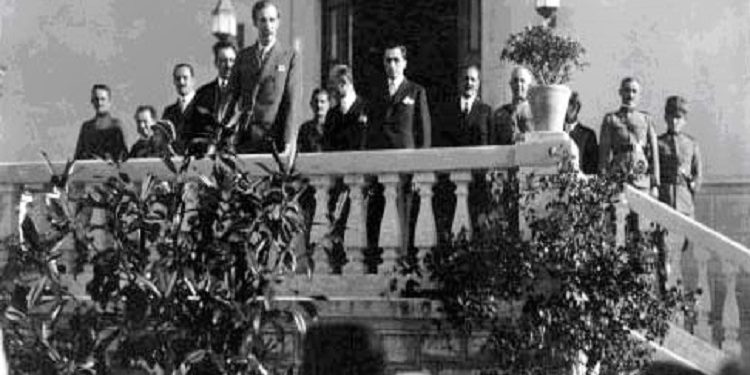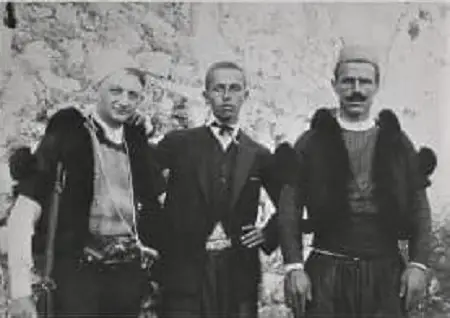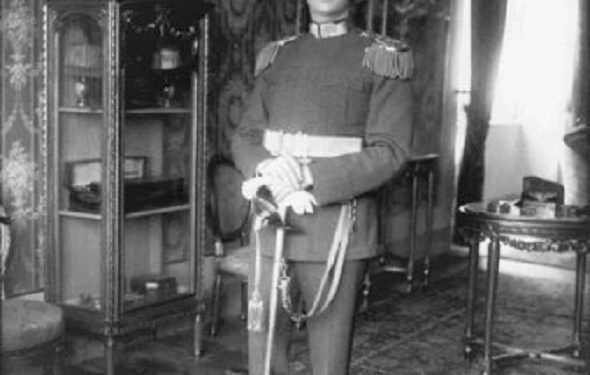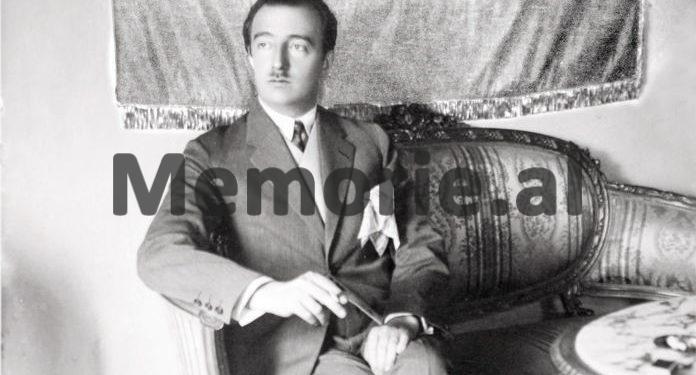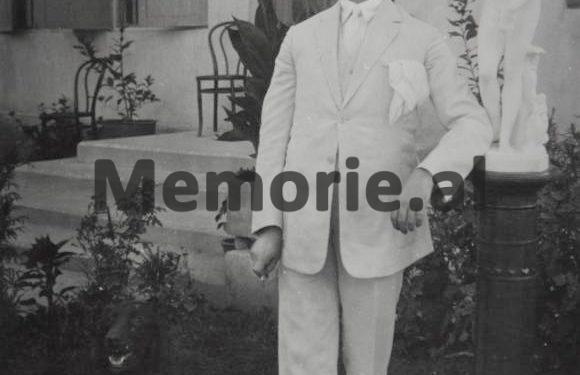By Joseph Roth
– It is already known that Zogu is a descendant of a family of Albanian princes who reigned in the 17th century, even earlier –
Memorie.al / At five in the afternoon on a Saturday, I go to the President of the Republic of Albania. The house is guarded by the army. The guard salutes. The adjutant waits in the hall. He is a major, young, thin, polite, prepared, able to talk about the weather, the Albanian landscape and the dangers of malaria: In the President’s room, there is another man, older, the Minister of Foreign Affairs , wise and corpulent. He is both translator and supervisor and provides everything.
The president is wearing the general’s uniform. According to an etiquette that binds the heads of state to their tables, Ahmet Zogu, only a step and a half away from the table, greets.
I lose in an armchair. The president tells the minister in Albanian that it is a pleasure to welcome a large German newspaper to Albania; the sympathy of the small Albanian people for the great Germany is undoubted.
The minister repeats in French. The President gives me permission to travel around Albania, in complete freedom and with the support of all authorities.
Then Ahmet Zogu starts speaking German. (He had once served with the Austrians). I have been in Albania for some time, I tell them how long I plan to stay, when and where I would like to go.
He does not expect the messengers to reflect only the truth. Truth – I answer – is a relative thing, what is true for someone, is a lie for someone else. The German envoys, however, are animated by the drive towards the truth.
Beyond that, I have no questions to ask – because I can answer everything myself. Interviews are an easy way to avoid embarrassing journalists.
As far as the session ceremony is concerned, the Albanian one does not differ much in terms of traditions, customs and respect from the ceremonies of other countries. Ahmet Zogu is younger than other presidents of European republics; he is in his early thirties.
He has a more intense and richer past than Europeans of his age. He has dead opponents in conscience and living opponents in the country.
The latter is a quality of all statesmen in the world, the former – deader opponents than conscience – an oriental specialty.
Ahmet Zogu, has a non-offensive appearance, is tall, conventionally represents the circumstances and is surprisingly blond. His thin hair is lost in that oriental face.
His behavior, which is determined by the duty to give to the audience, is more the effect of prudence than of innate certainty. The simplicity of the words, the way he articulates them, the empty politeness of the questions, are manifestations of representative tasks that are not exercised very often and therefore even more painful. He feels – for no reason – forced into a sort of Crown Prince Banality.
It is said that his military skills are very strong. During the First World War, he did not, as the current legend says, conquer Durrës at the head of the Albanian troops.
In this country, where one farmer in ten is a military genius and another in ten is a marksmanship genius, it is very difficult to excel in military talent. He is said to be a ruthless dictator.
But in Albania, where every leader would like to be a dictator himself, every landowner, his vassal and everyone who can read and write would like to be his secretary, perhaps nothing but a ruthless dictatorship, it is not possible. Ahmeti himself seems to be less dictatorial than his circle, who are more experienced, more cunning, more ruthless than him and who, for the most part, have behind them many years of training during the period of the Ottoman occupation.
Of all the qualities that characterize him in the country, to honor a dictator, the President of the Republic of Albania seems to know only the fear of his country – of course with good reason, in a country where it is not necessary to be a dictator, to be shot if necessary. Ahmeti, moreover, enjoyed the hospitality paid by the Yugoslavs; ‘invaded’ Albania with the help of Yugoslav gangs and then concluded the famous pact with Italy.
But if for more than eight hundred years, most influential people in the Balkan world have not refused money, especially if it is paid by two opposing parties – why should Ahmeti be an exception?
Yugoslavia’s selfless friendship for Albania, on the other hand, has not yet been demonstrated. But even if I doubted (with good reason), the totally disinterested patriotism of Ahmet, the perhaps selfish ambition of the President, corresponds in many points to the real needs of the country, which faced the choice, to place itself under the protection of a more evolved neighbor.
Or a more insecure one struggling with his inner struggles chooses the former. The president has also been reprimanded that his image decorates all the walls, stamps and coins.
Indeed, it is impossible to judge with the democratic morals of Westerners the conditions of an Eastern state whose history consists of repression, whose customs are called corruption, whose culture is a mixture of romantic naivety, autochthonous bucolic and intrigues imposed from outside.
Likewise, if one were suddenly transplanted to the middle Ages, one might not be outraged by the burning of witches. An effort must be made to observe Ahmet, with eyes free from prejudices, and to interpret him, outside of his environment.
Meanwhile, it should be known that he is a descendant of a family of Albanian princes, who had already reigned in the seventeenth century, even earlier – perhaps with not democratic methods at all. It should also be known that a Parliament in Albania could not be different from what it is.
It will remain a “frontal parliament” for another twenty years. It is left at the mercy of the authority of cliques and the will of the head of state, such as the ‘Scupstina Jugoslave’ (Serbian Parliament) and is as important as the Parliament of Budapest and above all of Angora.
It should also be known that Ahmet Zogu’s opponents and enemies do not in any way have a more Western morality than the President and I know some of them. Of the nine hundred and twenty educated Western Europeans who have left the country since Ahmet Zogu came to power, of the seven politicians who have fled to Yugoslavia since 1925, of the twelve who have lost their lives since 1922, I suppose there have been none the one who wanted to implement a different method of government, from that of Ahmet Zogut – and don’t blame them for that.
In Albanian politics and in Eastern politics in general, self-defense is a much broader concept, and plays almost the same role as state interest, for Western Europeans. First of all, a slow and painstaking education must begin to turn shepherds, tribal chiefs, gang leaders and religious fanatics into citizens.
However, if Ahmet Zogu is competent and able to undertake this task, it is very doubtful. Currently, even his connection with Italy worries him. Today he is no longer able to set Italy and Yugoslavia against each other. Today he fervently believes in a renewed attempt by Yugoslavia to get closer to him.
But Yugoslavia prepares fierce armies and new conspiracies. Italy protects its own interests and not the life of the Zog. And so this young man, who has already had to put down three uprisings, is standing in a brilliantly cut general’s uniform, with an immense appanage, in a princely house for Albanian conditions, bourgeois for ours, protected by a guard of whose body, loyalty, is as relative as anything in this country, advised by politicians, who have sharpened their cunning in the Turkish military service and tempered their patience in the Turkish military service – this young one – who could do a quiet student life in Paris – sits there, shaking and rough, waiting for a fourth uprising.
He is not reprimanded for the deaths he is alleged to have caused, but above all, for the sums he would have received. For even if he had not collected them personally, others would still have received them less deservingly: the small but well-fed upper class of learned leeches, the Turkish scribes, the corrupt brokers of corruption. Ahmet Zogu can still be President tomorrow, the day after tomorrow, he won’t be anymore and someone else who differs very little from him can sit in his place. /Memorie.al
Frankfurter Zeitung, 29.5.1927




